Cuban communist intellectuals discuss the future of socialism
Tuesday, 23 November 2010
Wednesday 3 November in Havana marked the start of a three day conference on “Socialism in the XXI century” organized by “Cuba, theory and society” under the auspices of the Havana Institute of Philosophy. Among a small number of foreign guest speakers was the editor of Marxist.com, Alan Woods. We publish here the report written by Alan on his return.
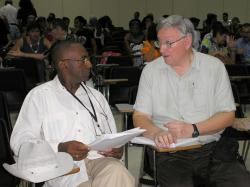
During the course of the conference, the date of the long-awaited congress of the Cuban Communist Party was finally announced. It will take place in April of next year and will debate a number of proposals regarding the economy contained in the document Draft guidelines for economic and social policy (Proyecto de lineamientos de la politica economica y social), copies of which were immediately snapped up from the news vendors’ stalls.
In this context, the discussions about the meaning of socialism in the XXI century took on a very concrete, relevant and urgent character. The vociferous campaign against Marxism and socialism that reached a deafening crescendo after the fall of the USSR has been echoed by revisionists who are doing everything possible to introduce bourgeois ideas into the labour movement. The struggle against bourgeois ideology is therefore an urgent task, and nowhere more urgent than in Cuba and Venezuela.
In the course of three very intense days, many hours were spent discussing themes such as crisis of capitalism, socialism and science, the national question (introduced by Juan Sanchez Monroe, a former ambassador to Yugoslavia and the Ukraine), the revolution in Latin America, Marxism and the ideas of Bolivar and Marti (introduced by veteran Cuban communist Olivia Miranda Francisco) and many other questions. To deal with every contribution would be an impossible task, which I will not even attempt to do. I will therefore limit my report to what I was able to jot down in my notes. As many points have had to be reconstructed from memory, this must not be taken as a stenographic report but rather my impressions of it.
The first session
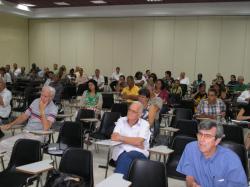
In recent years there has been considerable interest in the ideas of Trotsky in Cuba. In the course of the conference, several people mentioned The Revolution Betrayed as a book that explained what had happened in the USSR – a subject that obviously has enormous importance for Cuban communists. The historian Felipe de Jesus Perez Cruz gave a very good Marxist analysis of Stalinism and the reasons for the collapse of the USSR, quoting from the book by two Cuban authors, Ariel Dacal and Francisco Brown, Russia: from real socialism to real capitalism (for which I wrote the introduction).
In his speech, comrade Felipe stressed the importance of the Bolshevik Revolution (“something that had never been seen before that changed the history of the world”) that was brought down by “mistakes and corruption”. Here are some of the points he made:
“Lenin had tried to combat the rise of bureaucracy by emphasizing the need for control by the workers and peasants and the soviets. But after Lenin’s death, there was a process of bureaucratic degeneration.” Felipe delivered a blistering attack on Stalinism, which he said “was responsible for the physical liquidation of the Old Bolsheviks.”
“In theory it was socialism but in practice power was in the hands of a minority of functionaries and administrators. The workers were alienated from control of production, the state and the Party. Recruitment to the bureaucracy was on the basis of unquestioning loyalty to the ruling circle, a privileged layer that took all the decisions and was hostile to all criticism. All criticism was seen as counter-revolutionary. The intellectuals were silenced and subject to censorship or self-censorship.”
He explained how under Stalin and his successors a growing part of the wealth produced by the working class was absorbed by the bureaucracy. This ended in the crisis of the 1980s, and ultimately capitalist restoration. “I am convinced that if we don’t want to repeat what happened in the USSR we must return to the ideas of Lenin,” he said.
Replying to questions and discussion, Felipe said:
“Instead of the word bureaucracy, I prefer to use the word funcionariado (officialdom – civil service). What I mean is rule by a group that has its own interests and is defending them. When the funcionariado takes power and wields it against civil society, it becomes a bureaucracy. The officials cannot transmit their privileges to their children as property, so they do so through political power and corruption. Can we build socialism like that? After Lenin died the potential of the Russian Revolution was lost. We now need to redirect the Cuban Revolution. In Cuba there are many forms of direct democracy that can be developed, including the trade unions.”
On the second day the chair was taken by Juan Sanchez Monroe. The subject was “socialism in the XXI century”. The first speaker Juana Rosales Garcia, who pointed out that the Venezuelan Revolution has opened up a fruitful debate with the participation of thinkers from different countries, including Noam Chomsky, Istvan Meszaros, Alan Woods and Mike Lebowitz.
She was followed by Olivia Miranda Francisco, who stated that after the fall of the USSR there had been a period of confusion “even in organizations calling themselves ‘socialist’” She attacked the detractors of Marxism and stressed that the genuine ideas of socialism go back to Marx, Engels and Lenin. “In the debate on socialism in Latin America there has been a deafening silence on the ideas of the founders of socialism – including Mariategui - and the first socialist revolution. Mariategui, Marti and Mella all had a close connection to the collectivist indigenous traditions of Latin America”, she affirmed.
She continued:
“The struggle cannot only be against imperialism. It must also be against capitalism. Mariategui and Fidel Castro both excluded the bourgeoisie from the revolutionary popular bloc, which consists of the workers, peasants and progressive intellectuals under the leadership of the Party. Only under socialism can full independence be achieved.”
“Socialism of the XXI century”
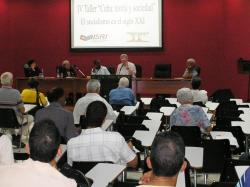
“I am glad to see that the title of this session is ‘socialism in the XXI century’ and not ‘socialism of the XXI century’. The latter suggests something entirely new and original, different from anything that has gone before. In reality, there is nothing new here: only a regurgitation of old ideas taken from the utopian socialists in the prehistory of the movement.
“It calls to mind the story of Aladdin in the 1001 Nights, when a crafty old wizard goes through the streets crying: ‘new lamps for old’. Aladdin’s girlfriend, who was not very bright, exchanges his valuable old lamp for a new shiny one, which is utterly worthless, and lands in a mess as a result.
“The theory of socialism of the XXI century, however, has one great advantage over all other theories: nobody knows what it is. It is an empty bottle that one can fill with any content.
“We must put this in its correct context. In the last period we have witnessed an unprecedented ideological offensive of the bourgeoisie against socialism and Marxism. The worst thing is that this noisy campaign has had an effect inside the communist movement worldwide. All kinds of revisionist ideas are circulating, and the most serious thing is that they are being echoed by people who call themselves communists.
“The assertion that the “free market” gives better results than a nationalized planned economy can easily be answered by an historical example. In Britain in 1940, when things were very serious, with Hitler’s armies poised to invade what did, the British ruling class do? Did they turn to “free market” policies? Did they say: everyone must do their own thing? No, they nationalized the war industries, they centralized and introduced measures of planning. Why? Because they give better results.
“The USSR defeated Hitler’s armies because the colossal superiority of a nationalized planned economy enabled them to produce more and better arms and machinery more rapidly than the Germans, who had all the productive resources of Europe behind them. The advantages of a planned economy are also shown by the transformation of backward Russian tsarism into an advanced modern economy that had more scientists than the USA, Japan, Germany and Britain together.
“In the end the USSR was undermined by bureaucracy. But bureaucracy is not an inherent result of a planned economy. It is a product of backwardness, as we see in Pakistan and Nigeria, which have nothing to do with socialism. A nationalized planned economy needs democracy as the human body. I do not speak here of the fraudulent bourgeois democracy that is only a fig-leaf for the dictatorship of the big banks and monopolies, but of a genuine workers’ democracy as advocated by Lenin in State and Revolution – the control of the working class from the bottom up.”
Speaking in the debate the economist Professor Ernesto Molina said that he read an article by Dietrich in Rebelion, which he replied to, quoting Lenin’s words on Rosa Luxemburg “sometimes an eagle can swoop lower than chickens,” adding humorously: “I must make a self-criticism. I now realise that Dietrich never flew higher than the chickens.”
One of the speakers from the floor, Fabio Grobar, a son of one of the founders of the Cuban Communist Party, emphasized the need for an internationalist policy. Another veteran Cuban communist, comrade Olivia Fernadez, said: “I am glad Alan Woods has stressed the question of Marxism. I wish to emphasize the point that whatever problems have arisen in socialism, it is not the fault of Marxist theory but the [incorrect] interpretation and application of these ideas.” And she quoted the words of Che Guevara: “Socialism and communism are a process of searching and discovery.”
Somebody asked: “What is wrong with an unfinished theory [referring to the “theory” of socialism of the XXI century]?” To this I answered as follows:
“We need to have a more rigorous approach to ideas. If this were a conference of physicists, just imagine that somebody says: ‘I have not done any experiments and have no proof whatsoever, but here is my theory.’ Such a person would be laughed out of the room. Or just imagine going to the dentist with a toothache and the dentist says: ‘Actually, I have never studied dentistry, but open your mouth anyway and I’ll have a go.’ You would run out of the surgery. Or a plumber knocks at the door and says: ‘I know nothing about plumbing, but let me get my hands on your central heating.’ You would throw him out of your house. But when it comes to Marxism, it seems that anything goes. Well, that is not the case. The ideas of Marxism are essentially the same as 150 years ago. This or that detail may have to be modified, but what is astonishing is how little needs to be changed.”
The Chinese road?
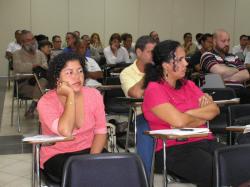
“As long as the capitalist world market exists, prices must reflect world market prices. Cuba is a small open economy in a turbulent capitalist world. We have always had to import goods and we must maintain our armed forces for defence. We have some big tasks to tackle, for example on the sphere of housing. Some of the problems we can solve within Cuba. Others are outside our control, in the world market.
“After the fall of the USSR we managed to resist. The main thing is for the people to be united. We must defend our conquests. But the state cannot control everything…”
In her speech about Vietnamese and Chinese “socialism” Gladys Hernandez Pedraza clearly indicated the dangers of following this line. While the figures indicate important gains in economic growth, this has been at the cost of huge and growing social inequality. In China there is inequality between “haves” and haves not”, between town and countryside, between East and West and between Chinese and non-Chinese nationalities, she said. Officially, 270 million Chinese are on low wages. Both China and Vietnam are facing serious environmental problems. In Vietnam the rivers, deltas and cities are badly affected. The contradictions in Chinese society are “explosive” she explained.
The general attitude towards the “Chinese model” was negative. Jorge Santana said frankly: “We cannot speak of socialism in China.” Speaking from the floor I stated that what was happening in China was a warning for Cuba:
“When Deng Xiaoping began his reforms in China he had no plan to go back to capitalism. But after 30 or 40 years of ‘market reforms’ the movement to capitalism assumed an irresistible character. The conditions of the Chinese workers in the privatized industries are reminiscent of the conditions described by Engels in The Conditions of the Working Class in England or the novels of Charles Dickens.”
The decline of theory has been reflected in terminology. The constant references to “neo-liberalism” imply that there are different kinds of capitalism – a “good” capitalism, Keynesianism or capitalism with a human face, and a “bad” capitalism (neo-liberalism). In fact, the crisis of capitalism renders reformism impossible. The huge deficits force the bourgeoisie to attack living standards and take back the concessions made in the past in such areas as health, housing and education. All Cubans are aware of the importance of these things and would not be happy to see them abolished in the name of “market socialism”.
It seemed to me that most (if not all) of those present were well aware that in talking of the Chinese (or Vietnamese) model, we are talking about capitalism. I pointed out that so-called market socialism was a contradiction in terms. You can have socialism or a market economy, but you cannot have both. Yet among some layers there is clearly an attempt to confuse the issue, referring in ambiguous terms to “a market economy with a socialist orientation” – whatever that might mean!
Workers control

Speaking from the floor, an economist (I do not recall his name) said: “After 50 years I am not at all satisfied with the way we have run the socialist economy. Just look at agriculture. We statized all the land but we were not able to cultivate a big part of it. Let us take the bull by the horns. We made a serious mistake at all levels by copying the model of the USSR. We confused state property with state control. The worker does not control production – that is what Marx called alienation. There has been a lot of talk as to whether we produce commodities or not. But we have to produce goods the value of which should reflect the costs of production.”
Juan Sanchez Monroe said: “I have seen all this before. I have heard the same discussions. In Russia, where the greatest revolution in history took place, there was a Party with 20 million people at its head. But what happened? Why was it overthrown? It was because we could not achieve the quality in the area where it was most important – in the goods produced for human consumption – to satisfy the requirements of the people.”
I was interested to hear what Camila Pineiro Harnecker would say. Since the subject she was speaking on was The Risks of expanding non-state enterprises in Cuba and recommendations as to how to avoid them, I assumed she would make out a case against privatizations.
From her written contribution I could see that Camila is opposed to the introduction of capitalism and wage labour, but I found her contribution to be insufficiently clear. For example: “Sometimes it is necessary to admit non-public elements, but this must be considered temporary and something to be overcome.” “Non-state enterprises can be socialist. A work collective must be able to run its own factory. Consumers also.” etc. This seemed very much like advocating co-operatives, which can easily be a stepping stone to outright privatization.
The most positive side of this speech was the emphasis on workers’ control: “Workers must feel motivated, part of the decision-making process.” That is one hundred percent correct and goes to the heart of the problem. But this was spoiled, in my view, by an excessive stress on “horizontal” (as opposed to “vertical” control). It is a regrettable tendency of some “twenty-first century socialists” to lay stress only on control, and not on ownership. But, important as the question of control is, the question of ownership – that is, property relations, remains decisive. Workers control, unless it leads to nationalization, can only be a transient phase and can be realized only partially. Under no circumstances can it be posed as an alternative to nationalization.
Confusion on what is meant by workers’ control would be disastrous for Cuba, as it was for Yugoslavia. The Leninist conception of workers’ control and management has nothing in common with the anarcho-syndicalist notion whereby the railway workers would run the railways, the miners the mines etc. Such a notion would have the effect of pitting factory against factory, worker against worker, worker against peasant, producer against consumer and so on. It would be the cause of great inequality.
In such a system, those workers in the more efficient and productive factories would be better off than those in the older and less efficient factories. They would end up with the mentality of proprietors and would act as such. This would undermine central planning utterly and deal a fatal blow to the nationalized planned economy. Thus “horizontalism”, despite the good intentions of its supporters, would lead directly to the capitalist market. For this reason, we firmly defend central planning and nationalization and are implacably opposed to any kind of privatization (except for some small shops and businesses) and “horizontalism”.
The Leninist idea is completely different. We are the most fervent defenders of centralized planning, but this must be accompanied by the democratic control and administration of the working class at all levels, both in drawing up the plan and putting it into practice. In this way, centralism and democracy are not incompatible but completely inseparable. The voice of the workers is heard at every level of the process, which involves a free flow of information and comments, from “top” to “bottom” and from “bottom” to “top”.
When we speak of workers control we do not have in mind only the workers of the particular enterprise, but the working class in general. A whole series of issues like safety, working conditions etc. will be directly in the hands of the workers, but the general plan must be decided by the whole of society, reflecting the general interests and priorities of the working class as a whole. That is what we mean by central planning.
What if there is a conflict between the views of a particular workplace and the general interest? In that case, the latter must take precedence over the former; just as in any democracy the minority must accept the views of the majority. One possibility would be run the workplaces on the basis of a tripartite committee, composed of one third from the state, one third from the trade unions, and one third directly elected by the workforce. However, for this to succeed, it is essential that both the unions and the state should be under the democratic control of the working class.
Speaking from the floor in the course of this debate, I said:
“I hesitated before speaking in this debate because the problems of the Cuban Revolution can only be solved by the Cuban people, and in the first place the Cuban communists. However, the fate of the Cuban Revolution is a matter of great importance, not only for the Cuban people, but for the workers of the whole world. The liquidation of the gains of the Cuban Revolution would be a terrible setback for the labour movement in Latin America and internationally. We have seen a catastrophe in Russia and now China and Vietnam are going the same way. We don’t want to see a repetition in Cuba.
“Let us speak clearly. There are people in Cuba who would like to go back to capitalism. They think that things will be better. They are wrong. It is said that people do not work in Cuba and in a market economy those who work are rewarded and those who do not are sacked. But that is not true. When the bosses close a factory they do not distinguish between a good worker and a bad one. All alike are thrown on the streets. Do not believe that things cannot be any worse. They can be a whole lot worse! We must not jump from the frying pan into the fire!
“Now to the point: we know that capitalism is an unjust, inhuman and wasteful system. Anything you like. Nevertheless, capitalism works, and has been working for about two hundred years. By the way, it is not the case that there is no planning in capitalism. In every capitalist enterprise there is a plan. The problem arises outside the enterprise, in the anarchy of the market, where everything is decided by the blind play of market forces, by the law of supply and demand.
“One can say that the market acts as a rough and ready control that limits waste, corruption and inefficiency. If a particular firm goes too far in this respect, it will have to close, driven out of business by more effective competitors. But what happens in a socialist planned economy? If all the major firms are nationalized, how can we prevent corruption, waste, mismanagement, bureaucracy and inefficiency? There is only one way possible: the conscious control of men and women through workers’ control and management, as Lenin explained many times.”
Jorge Luis Santana, quoting from The Revolution Betrayed, pointed to the danger of capitalist restoration in Cuba:
“I ask myself to what extent our ideas are correct and realistic? What do communism and socialism mean for the average Cuban today, or for the world today? We need a cause to defend and hope for the future in a world that is torn by wars and crises. We need a profound analysis of our old positions, a complete remodelling of revolutionary positions on a world scale. We need to innovate as Lenin did.”
Discussion in the Institute of Philosophy
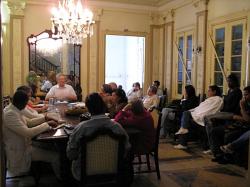
Whereas at the conference the time available for contributions was limited by the large number of speakers, I was able to speak for an hour, in which I attempted to explain the reasons for the collapse of Stalinism on the lines of The Revolution Betrayed and Ted Grant’s Russia, from Revolution to Counterrevolution.
What surprised me favourably was the degree of agreement among virtually all who spoke. Nobody expressed any real differences with the analysis I had provided, including veterans of the Communist Party. There was a lot of interest and a lively session of questions and contributions. Here are some of the comments (I was not always able to get the names):
“In the CPSU there were supposed to be 18 million Communists. But they were not able to prevent what happened. They were waiting for a lead from the top, and when it never came they were disoriented.”
“Yes, but if you were to ask people today, many would say: things were better before…”
“The big failure was a lack of freedom to discuss. This did great damage to art and culture. It was a closed culture, not open to ideas from the outside.”
“What happened in the USSR was not inevitable. It could have been prevented.”
Somebody asked about the theory of state capitalism, to which I replied:
“The so-called theory of state capitalism is a theory that explains nothing. It is wrong in theory and disastrous in practice. If one characterises the Soviet Union as state capitalism, then it must have the law of motion of capitalism: booms and slumps, which was not the case. One is then left with the conclusion that there is a social system called state capitalism, which is completely unknown to Marxism, a form of capitalism that is capable of a long period of high growth rates and no unemployment, that is to say, a system that is historically progressive in that it develops the productive forces to an unheard-of degree. This would require a fundamental revision of all the basic postulates of Marxism. One would have to re-write the three volumes of Capital.
“In fact, no such revision is necessary. In The Revolution Betrayed Trotsky provided a Marxist explanation of the phenomenon on the lines of the classical ideas of Marx and Lenin. This analysis has stood the test of time.
“While superficially attractive, the theory of state capitalism was disastrous in practice. When faced with the threat of actual capitalist restoration in Russia, what could the defenders of this theory say? That there was basically nothing to choose between the two things? That it made no difference if nationalized property was privatized? It is only necessary to formulate the question concretely to see the mess one gets into with confused theories.”
I was pleased to note that my most recent book Reformism and Revolution has aroused a lot of interest in Cuba. The one copy in the library of the Institute of Philosophy has been read so much it was in a sorry state, and the few copies I was able to bring with me were in much demand. The editorial Ciencias Sociales, which previously published the Cuban edition of Reason in Revolt, has agreed now to publish Reformism and Revolution.
The debate has begun
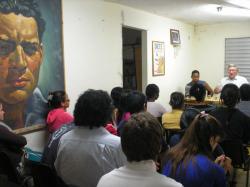
From my brief visit, one thing is clear. Everybody in Cuba has an opinion about the economic changes proposed for the Party Congress.
While it is possible to draw comparisons with Russia, there are also important differences. By 1989, the October Revolution was a distant memory for most Russians. The old traditions had been buried by the bureaucracy for decades. But in Cuba the Revolution took place within living memory. Most Cubans are fiercely proud of the gains of the Revolution and would not be prepared to surrender them without a fight. The same goes for members of the Communist party, who are painfully aware of the catastrophe that capitalist restoration has meant for the people of the former Soviet Union and Eastern Europe.
In private conversations, many expressed their firm opposition to any attempt to drag Cuba down the capitalist road. Juan Sanchez Monroe told me: “Do you know how many people I have known in Russia and Eastern Europe have committed suicide, have hanged themselves or put a bullet in their brain? No, nobody speaks of such statistics, but there are many. That must not happen here.”
The Party Congress is eagerly awaited and expectations are high. The future of the Cuban Revolution is too important to be decided by a small group. There must be a thorough and democratic discussion at all levels, starting with the Congress. This debate has already begun.
London 21 November 201

No comments:
Post a Comment
Comments